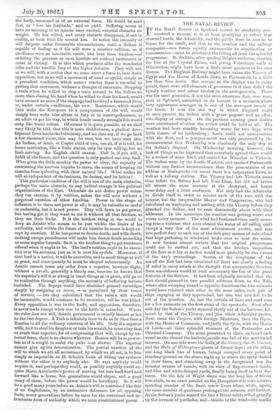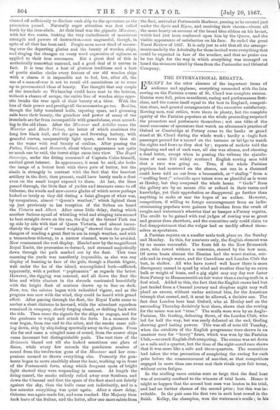THE NAVAL REVIEW.
IF the Naval Review at Spithead cannot be absolutely pro- nounced a success, it is at least gratifying to reflect that
crowned heads, the Admiralty, and the public were in nowise to blame for the result, and that to the weather and the railway companies—two forces equally unamenable to supplication or remonstrance—must be attributed the falling off from the splendid programme. St. Swithin, after spoiling Belgian uniforms, marring the fete at the Crystal Palace, and giving Volunteers colds at Wimbledon, might have been a little more gracious in his own diocese. The Brighton Railway might have taken the Viceroy of Egypt and the House of Lords down to Portsmouth in a little less than four hours. But manqué as the display was in many points, there were still elements of greatness in it that defied the squally weather and minor hitches in the arrangements. There was the most powerful, if not the most numerous fleet ever seen, even at Spithead, assembled to do honour to a monarch whose very appearance amongst us is one of the strangest events of the times. It was the one way in which England could at once present the Sultan with a great pageant and an effec- tive display of strength. On the previous evening great doubts were entertained whether the review could be held at all. The weather had been steadily becoming worse for two days, with little chance of its moderating ; boats could not communicate with the fleet, and a postponement was only prevented by the announcement that Wednesday was absolutely the ouly day at the Sultan's disposal. On Wednesday morning, however, the look of things so far improved that everybody agreed there would be a review of some kind, and started for Waterloo ex Victoria. The Sultan went by the South-Western, and reached Portsmouth without any further inconvenience than the presentation of an address at Basingstoke—it semis there is a corporation there, as well as a railway station. The Viceroy had left Victoria some time before the Sultan had left Nine Elms, but did not arrive till almost the same moment at the dockyard, and hence some delay and a little confusion. Not oily bad the Admiralty to divide itself in order to receive each of the two with due honour, but the irrepressible Mayor and Corporation, who had calculated on waylaying and settling with the Viceroy before they attacked the Sultan, had to rush distractedly about with their addresses. In the meantime the weather was getting worse and worse every moment. The wind had freshened since early morn- ing into a violence that soon cleared the water of all sailing craft except a very few of the most adventurous yachts, and rose into perfect fury as each one of the dull grey masses of rain-cloud that kept gathering to windward broke over or near the scene. It now became almost certain that the origival programme could not be carried out, and that the briefest inspection of the fleet as it lay at anchor would most probably be the extent of the day's proceedings. Stories of the roughness of the sea off the Nab had been circulated till there was clearly a feeling of relief in many minds at the thought that comparative freedom from sea-sickness would at least accompany the loss of the great features of the Review. It had been originally intended that the fleet should proceed in two parallel columns down to the Nab, where after sweeping round in opposite directions the two columns would have rejoined each other in the same order, each pair of ships engaging as they approached, but this was now felt to be out of the question. At last the curtain of haze and scud rose for a few moments on the first scene of the spectacle. Soon after mid-day the Sultan's yacht steamed slowly out of the harbour, fol- lowed by that of the Viceroy, and the other Admiralty yachts. Next came the Tanjore, with foreign Ministers, then the Ripon, with the House of Commons, and.lastly the Syria, with the House of Lords—all three splendid steamers of the Peninsular and Oriental Company. The scene presented to those on board each vessel as she cleared the harbour:mouth was full of the most varied interest. On one side were the hulls:of the Victory, the St. Vincent, and the Duke of Wellington—giants of former days ; on the other, one long black line of human beings occupied every point of standing-ground on the shore, right up to where the spray dashed in their faces, and stretchiug away in the foreground was the monster avenue of vessels, with its vista of flag-crowned masts, and blue and white-fringed yards, finally losing itself in hazy dis- tance. On the Isle of Wight shore was the long line of fifteen iron-clads, in an exact parallel on the Hampshire side were a corre- sponding number of the finest screw liners afloat, while, again, the same number of gunboats prolonged the columns still further. As the Sultan's yacht neared the line a Royal salute rolled grandly up the terraces of portholes, and—thanks to the wind—the smoke cleared off sufficiently to disclose each ship to the spectators as the procession passed. Naturally eager attention was first called forth by the iron-clads. At their head was the gigantic Minotaur, with her five masts, looking the very embodiment of monstrous strength and powers of destruction—not ungraceful, though, in spite of all that has been said. People seem never tired of mourn- ing over the departing glories and the beauty of wooden ships, and ringing the changes on every word expressive of ugliness as applied to their iron successors. But a great deal of this is testhetically somewhat unsound, and a good deal of it untrue in fact. It is true that a host of glorious traditions and a host of poetic similes clothe every feature of our old wooden ships with a charm it is impossible not to feel, but, after all, the
u se of a man-of-war is not to recall old associations or to come up to preconceived ideas of beauty. The thought that any couple of the ironclads on Wednesday could have sent to the bottom, -without a chance of escape, the entire line of wooden ships oppo- site breaks the true spell of their beauty at a blow. With the loss of their power and prestige all the accessories go too. Besi les, though the lofty tesselated hulls, tapering spars, and gleaming sails have their beauty, the grandeur and power of many of the ironclacls are far from incompatible with gracefulness, even accord- ing to the old ideas. After the Minotaur and Achilles came the Warrior and Black Prince, the latter of which combines the long low black hull, and the grim and frowning battery, with graceful curves, comparatively light spars, and bows that sit on the water with real beauty of outline. After passing the Pallas, Valiant, and Research, about whose appearance not quite so much can be said, the turret ships came into view. The Royal Sovereign, under the fitting command of Captain Coles himself, excited great interest. In appearance, it must be said, she looks the image of a butter boat with three pats of butter, but the simile is strangely in contrast with the fact that the heaviest artillery in the fleet, then present, could have barely made a dent even on the small target exposed to them. At last, the lines passed through, the little fleet of yachts and steamers came to off Osborne, the woods and new-mown glades of which never perhaps looked so lovely as they did during a faint glimpse of what was, by comparison, almost "Queen's weather," which lighted them up just previously to her reception of the Sultan on board the Victoria and Albert. After some little delay, during which another furious squall of whistling wind and stinging rain seemed to beat straight down on the sea, the flag of the Grand Turk ran up side by side with that of Queen Victoria, and almost imme- diately the signal of "annul weighing" showed that the possible dangers of sending a great fleet to sea in rough weather, and with a tremendous tideway, in a narrow channel, were to be avoided. Now commenced the real display. Headed now by the magnificent Royal Yacht, the procession re-formed, and steamed majestically down through the path marked out by the fleet. This time manning the yards was manifestly impossible, as also was any display of bunting in face of the gale, though a Danish frigate, well under the lee of the island, accomplished both—afflicted, apparently, with a perfect " peplomania " as regards the latter. However, the rigging was manned, and all down the fleet the blue and white clusters in the shrouds contrasted beautifully with the bright flash of marines drawn up in line on deck. Now, too, the salutes began with redoubled vigour, and as the progress was now with the wind, they could be heard with grand effect. After passing through the fleet, the Royal Yacht came to anchor a short distance to leeward, while the attendant squadron remained in company, slowly forging ahead, or drifting back with the tide. Then came the signals for the ships to engage, and for the gunboats to weigh and attack the forts. In a moment the roar began, from one end to the other, and the smoke came roll- ing down, ship by ship fading spectrally away in the gloom. From the far end came a mingled mass of sound, from the nearer ships came incessant but distinguishable peals. The vast tiers of the Britannia blazed out till she looked sometimes one glare of flame, while every few seconds the ponderous crashes of sound from the twelve-ton guns of the Minotaur and her com- panions seemed to drown everything else. Presently the gun- boats began to move stealthily about the haze, working up in front of the Portsmouth forts, along which frequent spots of bright light showed they were responding in earnest. At length the firing ceased, the smoke sullenly rolled away over Southsea and down the Channel and first the spars of the fleet stood out faintly against the sky, then the hulls came out indistinctly, and in a few minutes everything was quiet again. After a short delay, Osborne was again made for, and soon reached. Her Majesty then took leave of the Sultan, and the latter, after one more salute from
the fleet, arrived at Portsmouth Harbour, passing as he entered just under the Syria and Ripon, and receiving their cheers—cheers all the more hearty on account of the broad blue ribbon on his breast, which had just been conferred upon him by the Queen, and the visible appearance of satisfaction on his face. So ended the great Naval Review of 1867. It is only just to add that all the arrange- ments made by the Admiralty for those invited were everything that could be expected in face of the weather, and that no praise can be too high for the way in which everything was managed on board the steamers hired by them from the Peninsular and Oriental Company.































 Previous page
Previous page